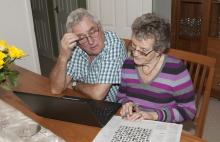Dementia Care: Individuals and Families
When someone notices memory changes in themselves or a loved one, it can be difficult to know what to do next. This section contains information on:
- Getting a diagnosis.
- Providing care at home.
- Supporting the family caregiver.
- Moving to a care facility.
Physical activity can reduce your risk of dementia
How much do you need to exercise to reduce your risk of getting dementia? It may be less than you think.
In this video, Wisconsin's First Lady Kathy Evers interviews Dr. Ozioma Okonkwo, a researcher from the Wisconsin Alzheimer's Disease Research Center. They discuss the relationship between exercise and brain health.
Simple lapses in memory are normal at any age. However, memory loss that often interferes with daily life can be a sign of changes in the brain. Still, memory loss is not always a sign of dementia. Confusion and memory loss can be symptoms of a variety of conditions. Some of those conditions are easily remedied. If you want to get to the bottom of changes in your memory and thinking, take two important steps: get a memory screening test and talk to your doctor.
Memory screening
Aging and disability resource centers (ADRCs) offer free memory screening. Memory screens are not a diagnosis. They are a tool to detect changes. The tool consists of a series of questions or tasks. It takes between five and 10 minutes to complete. The results of the memory screening can tell you whether you should talk to your doctor about your memory or other concerns with thinking and concentration. There are many causes of memory trouble and increased confusion that can be reversed. Memory screening can be done at the ADRC, in your home, or at another location. The results are confidential.
Talking to your doctor
Talking to your doctor about memory concerns for yourself or a loved one can be a stressful experience. Here are some resources that can help you prepare and know what to expect when you talk with your physician.
- Do Memory Problems Always Mean Alzheimer's Disease?
- Memory Loss: When to Seek Help
- Alzheimer’s Disease: Diagnosis
- Visiting Your Doctor
Wisconsin Alzheimer's Institute clinics
If you would like a second opinion about your memory concerns, you can contact a Wisconsin Alzheimer’s Institute memory clinic for an appointment. The institute offers a network of 44 memory clinics. Among these are two clinics in Milwaukee serving the African-American and Hispanic communities. These clinics provide care to more than 3,000 new patients each year. Many of those are from rural, underserved parts of Wisconsin.
Providing care at home for someone with dementia has rewards as well as challenges. You don’t have to do it on your own. This section provides information on available programs, supports, and other resources.
- ADRCs—ADRCs can help you find local services, make care plans, and connect you with your local dementia care specialist.
- 24/7 Alzheimer's Association Helpline — Call 800-272-3990 to talk with a clinician about your situation. Experts at the helpline can discuss treatment options, local programs, and financial decisions with you. Help is available in over 200 languages. Your call is confidential.
- Online training for family caregivers—This online training video is for people who support a family member with Alzheimer’s or dementia. This training is available in English and Spanish.
- Wisconsin Dementia Care Learning Center—This series of online training videos is from the University of Wisconsin-Oshkosh. It is for community members, businesses, first responders, professionals, families, and others who interact with people with dementia.
- Alzheimer's Family Caregiver Support Program—This program provides respite, education, and other support to caregivers of people with Alzheimer’s disease or dementia. To qualify, the income of the person with dementia and their spouse cannot exceed $48,000 (after deducting dementia-related expenses).
- National Family Caregiver Support Program—This program provides respite, education, and other support to caregivers of older adults (those over age 60). There is no income limit or eligibility to receive services. However, low-income people and those with dementia are given priority.
Caring for family and friends is an expected part of life. But when short-term caregiving turns into long-term caregiving that lasts years, it is normal to feel stressed. These resources can help make caregiving more manageable.
Community support
ADRCs can help you find local services, make care plans, and connect you with your local dementia care specialist.
Support groups
Talking with people with similar experiences can help relieve stress. These groups also provide an opportunity to build new friendships and share ideas. Find a caregiver support group in your area. Contact:
Adult day care centers
Adult day care centers are places where people living with dementia can spend supervised time during the day. They are usually open during normal business hours. Services may include personal care, supervision, behavior management, and social activities. Find providers near you.
Memory cafes
Memory cafes are social gatherings for those with memory loss or dementia and their caregivers. The get-togethers happen in places such as coffee shops and libraries. It is important for people living with dementia and their caregivers to socialize without fear of embarrassment from the stigma around the symptoms of dementia. Memory cafes offer an opportunity to meet new people or to visit with friends in a place where all can feel comfortable.
Balancing work life
Caregiving can conflict with job responsibilities. Caregivers who work with their employer to develop a plan to balance home and work life demands will be less stressed and more satisfied with the quality of care they provide. The AARP Guide to Caregiving While Working describes employee benefits and legal options. Wisconsin Department of Health Services (DHS) has also created a webpage of resources that you can share with your employer.
Self-care
Being a family caregiver does not mean that your life or your needs stop being important. Taking time for self-care allows caregivers to rejuvenate and to avoid becoming resentful or depressed. Learn more with these resources.
- Alzheimer’s Association: Caregiver Stress
- Family Caregiver Alliance: Self-Care for Family Caregivers
- Caring.com: A Caregiver’s Guide to Coping with Stress and Burnout
- National Institute on Aging: Tips for Caregivers
Wisconsin has put together a Dementia Resource Guide Book (PDF) for people with intellectual and developmental disabilities. The guide provides information on memory screens, caregiving, and available services.
The National Task Group–Early Detection and Screen for Dementia was created because the typical screening and evaluation tools may not be feasible for people with intellectual and developmental disabilities. This memory screen was designed to help find problems early and to begin the conversation with health care providers.
In the United States, 6% of adults with intellectual and developmental disabilities will be affected by some form of dementia after age 60. For adults with down syndrome, an estimated 50–70% will be affected by age 60. Early identification could help people identify and deal with signs and delay symptoms.
An advance directive describes, in writing, your decisions for yourself regarding health care or finances. The Power of Attorney for Health Care document allows you to outline the treatments you want or do not want. You can also detail how other health care decisions should be made for you if you become unable to speak for yourself. The Power of Attorney for Finances and Property document allows you to name an individual and what decisions they are allowed to make if you are unable.
Advance directive forms (including a living will and power of attorney for health care) are available at Consumer Guide: End-of-Life Planning. Advance directives are legal documents, but you do not need an attorney to complete them. If you have any questions about the forms or what they mean, the Wisconsin Guardianship Support Center is a free service that can answer questions. The DHS guide, Your Right to Direct Your Future Health Needs, P-62025 (PDF) also has information.
There are many factors that should be considered when deciding to move to a long-term care setting.
These resources can help walk you through the process.
Home Away From Home: Relocating Your Parents
How to find a care facility
Choosing the right care facility can be challenging. There are a variety of options, from attending an adult day care center that will provide care only during the day to residing in a skilled nursing facility with available 24-hour medical staff. The type of facility to choose is based on many considerations, including the level of care needed.
Residential care options
- Consumer Guide: Finding and Choosing a Community-Based Residential Facility
- Consumer Guide: Finding and Choosing an Adult Day Care Center
- Consumer Guide: Finding and Choosing an Adult Family Home
- Consumer Guide: Finding and Choosing a Residential Care Apartment Complex
- Consumer Guide: Provider Search
- Consumer Guide to Health Care: Finding and Choosing a Nursing Home
Person-centered care
Person-centered care is an important concept in providing quality care for people with dementia. Ask the care facility if they practice person-centered care and how they include the concept in their day-to-day routine.
Hospice care
Alzheimer’s disease and other dementias follow a path of gradual decline in a person’s health and abilities. In the later stages of Alzheimer’s disease, the palliative care concepts of hospice care can bring comfort and relief for people nearing the end of life. Hospice care programs vary in the services offered. However all can provide comfort care for a person with dementia near the end of life, either in the person's home or at a hospice care facility. For more information about hospice care, visit:
For more information
Stay up to date on the latest news about Alzheimer’s disease and other dementias. Join our email list.
Questions about the State Dementia Plan? Email dhsdementiawebmail@dhs.wisconsin.gov




